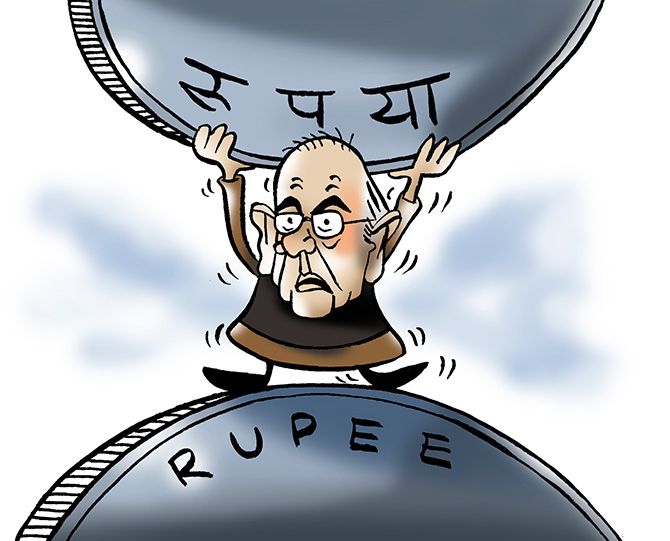While the finance minister had a great opportunity to come out with flying colours while presenting this last Budget of his government, he didn’t, says Omkar Goswami.
Illustration: Uttam Ghosh/Rediff.com

I, like many others, expected that the last full year’s Union Budget before the elections would have many heads of expenditure directed at India’s rural poor.
The Budget is but an instrument of politics of the government in power, and why should it ever be otherwise?
However, this is what I had thought the Budget would be: first, large expenditure growth for rural India -- some revenue but much of it employment generating capital outlays;
Second, a significant uptick in key infrastructure spends;
Third, a clear road map to how the government plans to help increase the dismal and steadily falling ratio of gross fixed capital formation to GDP, without which an era of sustained 7.5 per cent growth is but a mirage;
Fourth, some tough revenue collection measures, especially direct taxes, now that post-demonetisation the state has a pretty good idea of who evades taxes and how;
And fifth, a determination to continue with fiscal responsibility.
Unfortunately, while I saw much of the first and some of the second, there was little of the third, fourth and fifth.
Let us take deficits first. The 2017-18 Budget estimated it at Rs 5.46 lakh crore, or 3.2 per cent of the GDP.
In the Revised Estimate for 2017-18, this has grown by almost 9 per cent to Rs 5.95 lakh crore to reach 3.5 per cent of the GDP.
It is a huge slippage of the kind that we have not seen in the recent past.
Moreover, the correction to 3.3 per cent of GDP for 2018-19 - itself an increase in the fiscal deficit of 4.9 per cent over the Revised Estimate of 2017-18, and more than 14 per cent over the Budget Estimate of the previous year -- doesn’t quite seem credible.
Once you breach the fiscal deficit target by such a large margin in one year, you can do so for the next, especially when it is a run-up to the general elections.
So, I take that fiscal deficit estimate with a pinch of salt.
Given the way crude oil prices have risen and are expected to rise, I also find it difficult to assume that the fertiliser subsidy will increase by just 8 per cent as assumed in the Budget, and that the LPG subsidy will resolutely remain flat.
Equally, with the finance minister’s clarion cry to dramatically raise the minimum support prices of agricultural products, it is quite possible that the food subsidy will be higher than estimated.
With the increase in expenditure almost across the board and this government’s harangue against “black” money, I was expecting some tough post-demonetisation actions to be announced against personal income tax evaders.
The finance minister complained about pathetic levels of taxable income declared by non-salaried tax payers, especially those who entered the net after demonetisation.
Yet, he did not outline a single proposal to increase tax collection from this vast army of crooks.
Instead, it is as if the Budget is built upon high expectations of direct tax revenue buoyancy -- of the kind that I haven’t seen for the past two decades and, somehow, scarcely expect to see now.
Of course, as in any Budget, there were some good proposals, such as the Rs 500,000 per year health insurance for 100 million poor rural families.
Yet, while the finance minister had a great opportunity to come out with flying colours while presenting this last Budget of his government, he didn’t.
Almost like his first, it untidily cobbled many paragraphs hither and tither without creating a coherent and consistent whole.
Notwithstanding the scores of 8, 9 or 10 that industrialists will bestow upon him, it is an opportunity lost. Sadly so.
Omkar Goswami is founder and chairman, CERG Advisory.











